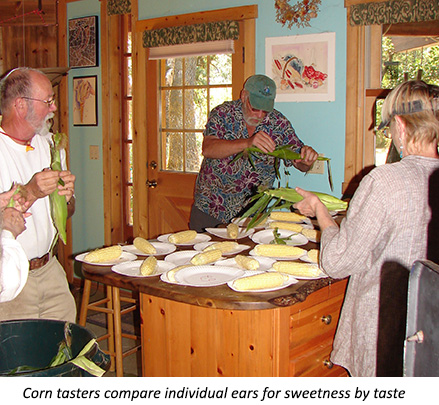Organic Farmers
Development and Evaluation of Biologically-Integrated Conservation Tillage Systems for Organic Vegetable Production
A primary goal in developing environmentally sound and profitable farming systems has been to prevent soil degradation and erosion loss, and wherever possible, enhance soil quality through organic matter management. Conventional tillage practices currently used for vegetable production in the Willamette Valley involve from 5-8 passes over the field. For the past four years we have been working with vegetable growers in the Willamette Valley to develop an integrated system of vegetable production using winter annual cover crops and rotary strip- tillage.
Use of Walnut Hulls for Weed Control
Controlling weeds using propane generated flame and steam treatments in crop and non croplands
New cover crops and cover crop management for organic vegetable producers in Maryland (yr. 1)
Targeted mowing as a weed management method increasing allelopathy in rye (Secaule cereale L.)
Winter rye (Secale cereale L.) is an outstanding cover crop in its suppression of early season weeds. This suppression has been largely attributed to allelopathy; ryeís allelochemicals inhibit weed germination and growth. However, its lack of suppression of late season weeds and its inconsistent results between years and regions hinder the use of rye as a cover crop. This study, which is Part I of a 2-year project, explores a management method that may be used to increase weed suppression of rye by manipulating its allelopathic activity.
Conservation tillage and cover crop systems for organic processing tomato production (Year 2)
The production of organic processing tomatoes requires large inputs of organic sources of nitrogen. Besides the addition of compost, manure, and other organic amendments, leguminous cover crops, grown during the winter, are important sources of nitrogen for a subsequent tomato crop. Present management of cover crops for tomato production generally requires significant amounts of tillage that may retard the improvement of physical and chemical properties of the soil.
Developing "Organic-Ready" Maize Populations with Gametophytic Incompatibility: Year IV
 Maize (corn) is an incredibly productive and profitable crop that works well in organic crop rotations in many parts of North America. Since the release of transgenic (GMO) varieties of maize in the mid-1990s it has become increasingly difficult to grow uncontaminated organic maize or to find maize seed that is free of transgene contamination.
Maize (corn) is an incredibly productive and profitable crop that works well in organic crop rotations in many parts of North America. Since the release of transgenic (GMO) varieties of maize in the mid-1990s it has become increasingly difficult to grow uncontaminated organic maize or to find maize seed that is free of transgene contamination. Create Two Open-Pollinated, Sugary Enhanced Sweet Corn Varieties--Year 4
 Very little sweet corn grown commercially today is open pollinated. Farmers who wish to save their own seed have few if any good choices of varieties to grow. And the hybrids of today have been developed for conditions that are different from those found on most organic farms, as they were selected to rely on fungicides and pesticides, and to effectively utilize soluble synthetic fertilizers in large quantities.
Very little sweet corn grown commercially today is open pollinated. Farmers who wish to save their own seed have few if any good choices of varieties to grow. And the hybrids of today have been developed for conditions that are different from those found on most organic farms, as they were selected to rely on fungicides and pesticides, and to effectively utilize soluble synthetic fertilizers in large quantities.Effect of Compost Extracts on Organic Seed Germination and Reduction of Weed Seed Expression
Effect of Compost Extracts on Organic Seed Germination Coordinator: Gladis Zinati, Ph.D., The Rodale Institute, Kutztown, PA Stakeholders: Organic farmers


